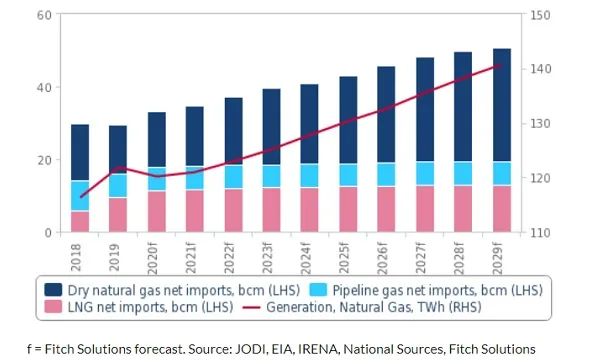
Renewable push falls short of dethroning gas in Thailand
LNG imports are still projected to more than double in capacity.
Gas is expected to remain a key power source in Thailand, with its share in the power mix tipped to decline from 65% in 2019 to only 60% by 2029, amidst challenges impeding the speedy buildup of alternative sources, according to a report from Fitch Solutions.
Reducing the country’s reliance on gas for power generation has been a government priority, given declining domestic gas production and diminishing pipeline gas volumes from Myanmar. As such, it has been looking to alternative options such as developing renewable energy and increasing its electricity imports from hydropower projects in neighbouring countries.
Although Fitch Solutions expects strong growth in these alternative resources, they commented that they are unlikely to grow fast enough to substantially offset the country’s heavy reliance on gas for power generation.
Further, the intermittent nature of renewables generation, as well as the ongoing opposition to hydropower projects in the region amidst a decline in output reliability due to abnormal weather patterns in recent years, will weigh on growth.
There has also been a rise in LNG imports, alongside the signing of multiple long-term supply contracts. LNG import capacity is projected to more than double, led by investments by PTT to two more projects. State-owned utility Electricity Generating Authority of Thailand (EGAT) also intends to expand their LNG import capacities after securing its first licence in 2018.
Almost every major power producer in Thailand is also looking to secure LNG import licenses, Fitch noted. Gulf Energy Development and B. Grimm Power secured their first sets of non-state LNG import licenses from the Energy Regulatory Commission (ERC) in May, the first private companies to secure rights to directly procure LNG for their own consumption.
Furthermore, global LNG prices have plunged in recent quarters, and prices are expected to remain fairly low over the coming years. This will reinforce its attractiveness as a supply source due to low production costs, the report noted.
“Furthermore, recent ambitions to transform Thailand into a regional hub for LNG will ensure greater liquidity and stronger LNG flows, at lower costs, into the market over the coming decade,” Fitch added.



















 Advertise
Advertise







